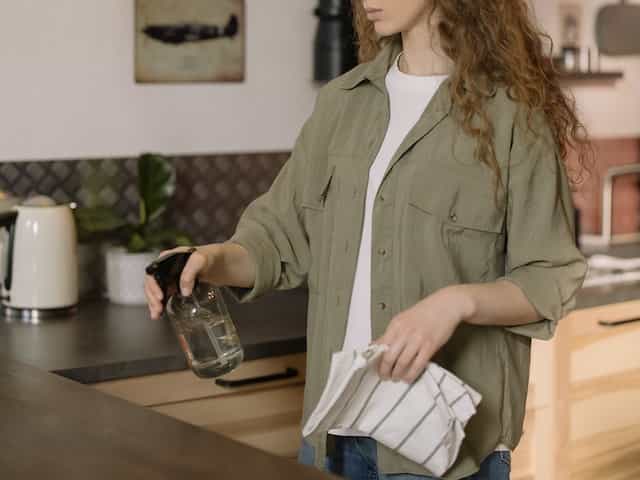Say goodbye to harsh chemicals and hello to good old white vinegar! Not only is it safe to use around your family and pets, but it’s also a natural and effective way to clean your home.
But before you start cleaning, you might be wondering what the best ratio of vinegar to water is. Well, the good news is that you have some flexibility when it comes to the ratio. It depends on how tough the cleaning job is, and also on personal preference.
For general cleaning purposes, a 50/50 ratio of white vinegar to water works great. This means that you would use equal parts white vinegar and water in your spray bottle. For example, if you fill your bottle with 1 cup of water, then add 1 cup of white vinegar. This ratio is strong enough to tackle dirt and grime, but not so strong that it’s overpowering.
If you prefer a less strong solution, or if you’re cleaning surfaces that could be damaged by acidic solutions, you can decrease the amount of vinegar and increase the amount of water. For a more gentle cleaning solution, you could use 1/4 cup of white vinegar for every cup of water.
Once you have your solution ready, you can start cleaning! Use it to clean countertops, windows, mirrors, tiles, and more. The possibilities are endless!
So next time you’re facing a cleaning task, give vinegar cleaning spray a try! Not only will it make your home sparkle, but you’ll also be doing your part to protect the environment and your wallet.
Which Vinegar Should You Use for Your Homemade Cleaning Solution?
When it comes to cleaning with vinegar, one of the most commonly used types is white vinegar.
White vinegar is made from grain and water and has a high acidic content, which makes it great for cutting through dirt, grime, and hard water stains. It’s also great at killing germs and bacteria which makes it a great solution for cleaning surfaces in the kitchen, bathroom, and around the house.
You can also use apple cider vinegar for cleaning, but it’s not recommended as much as white vinegar. It is a bit milder in its acidity, which makes it less effective for heavy-duty cleaning tasks. While it does have a strong smell, it is not as strong as white vinegar, so it may be a better choice for some people who are sensitive to strong smells.
Additionally, some special kinds of vinegar are available such as malt vinegar, rice vinegar, and balsamic vinegar, but they are not recommended to be used as a cleaning solution, they are more commonly used as a seasoning or cooking ingredient. Specialty vinegar is not recommended to be used as a cleaning solution, but for seasoning and cooking.
It’s important to note that when using vinegar for cleaning purposes, always make sure to use high-quality, food-grade vinegar that is safe to use around food.
What Surfaces are Safe and What to Avoid
Here are some examples of how the vinegar cleaning solution can be used on different surfaces:
- Countertops: Use the vinegar cleaning solution to clean and disinfect kitchen countertops. It’s great for removing food stains and eliminating germs.
- Tile floors: Mix the solution with warm water and use it to mop tile floors. The vinegar helps to dissolve dirt and grime while leaving floors shiny and clean.
- Windows and mirrors: Spray the solution on windows and mirrors and wipe clean with a microfiber cloth. The vinegar helps to remove streaks and leave surfaces looking crystal clear.
- Bathrooms: The vinegar cleaning solution is great for cleaning bathroom fixtures, toilets, and shower walls. It’s especially effective at removing soap scum and hard water stains.
It’s important to note that vinegar is acidic, it may cause damage or dullness over time to certain surfaces if it is used repeatedly, especially surfaces that are natural stone, wood, and some metals.
Before using vinegar cleaning solution on any surface, it’s best to test it in an inconspicuous area first and check the manufacturer’s instructions for the cleaning of your particular surface.
It’s also important to note that the vinegar solution is not recommended to be used on marble surfaces as it may etch or dull the surface. And never use it on aluminum surfaces, as it can corrode the metal.
It is also not recommended to use it on hardwood floors, as the acidity in the vinegar can strip away the finish and cause damage to the wood.
Additionally, it’s not recommended to use a vinegar cleaning solution on surfaces that are painted or varnished, like painted walls or furniture, as the acidity in the vinegar can cause discoloration or damage to the paint.
In summary, while the vinegar cleaning solution is effective and safe to use on many surfaces, it’s important to exercise caution and use it appropriately on different surfaces.
Test the solution on an inconspicuous area first and check the manufacturer’s instructions for the cleaning of your particular surface. This will help you avoid any potential damage or discoloration caused by the acidity of the vinegar.
Conclusion:
With your vinegar cleaning solution, you can tackle various cleaning tasks around your house.
Whether you’re cleaning countertops, tile floors, windows, or even removing stains, vinegar is a versatile and effective cleaning agent.
Plus, using vinegar is not just good for your home, it is good for the environment and budget-friendly, as it is cheaper than many commercial cleaning products on the market.
So not only are you getting a spotless home, but you’re also doing your part to reduce your carbon footprint. Give it a try, you might be surprised at how much you like it!
If you’re looking for more ways to use vinegar, check out How to Clean Mirrors with Vinegar.
Thanks for reading my blog.
-Baking Soda Guy
Photo by cottonbro studio from Pexels

